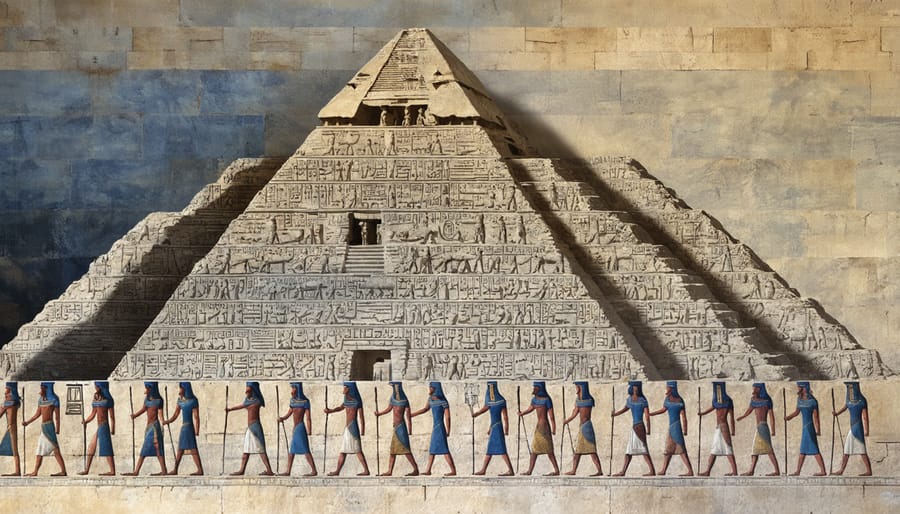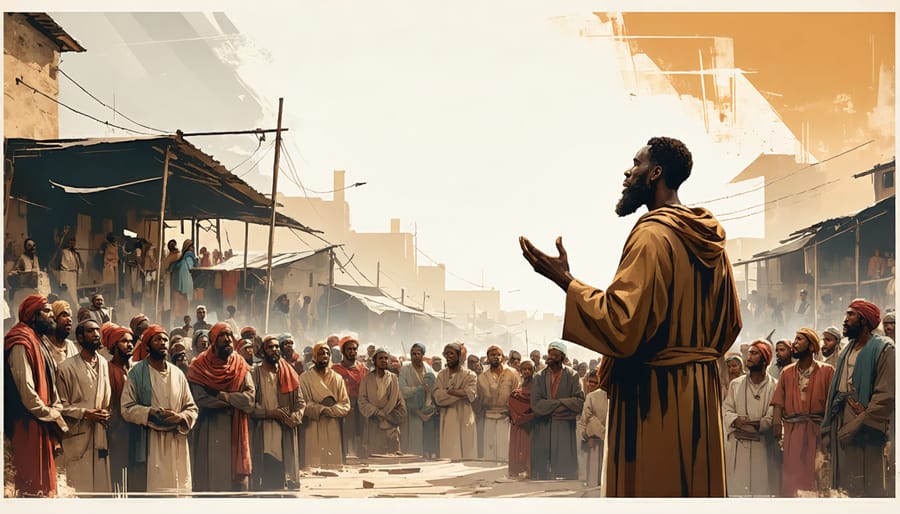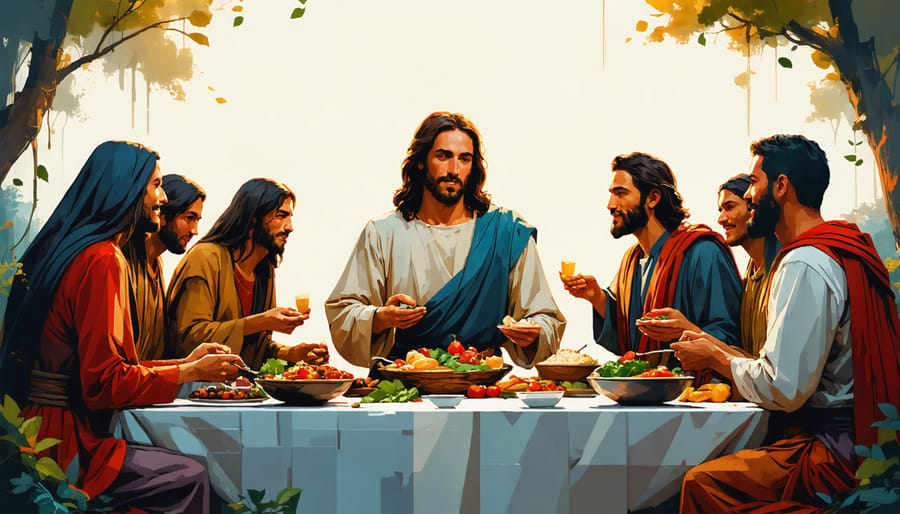Throughout Scripture, God’s heart for justice and compassion shines as a brilliant testimony to His character and His expectations for His people. From the prophets’ bold calls for righteousness to Jesus’ radical examples of love and inclusion, the Bible presents a compelling biblical view on social justice that remains powerfully relevant today. The sacred text doesn’t merely suggest that we should care for the marginalized and fight for the oppressed—it commands it as an essential expression of authentic faith. In the pages of both the Old and New Testaments, we find countless examples of God’s people being called to challenge systemic inequality, advocate for the vulnerable, and create communities where every person’s dignity is honored. These biblical accounts don’t just inspire us; they provide a divine mandate for how we should engage with the social issues of our time, offering timeless principles that bridge ancient wisdom with contemporary challenges. As we explore these powerful examples, we’ll discover how God’s Word consistently champions the cause of justice, mercy, and human dignity, calling believers to be active participants in bringing His kingdom values to earth.
The Exodus: God’s Liberation of the Oppressed
Breaking Chains of Slavery
Throughout the Bible, God consistently demonstrates His opposition to slavery and systemic oppression. The Exodus narrative powerfully illustrates this through God’s dramatic intervention to free the Israelites from Egyptian bondage. “I have surely seen the affliction of my people who are in Egypt and have heard their cry because of their taskmasters. I know their sufferings” (Exodus 3:7) reveals God’s deep concern for those suffering under oppression.
This divine response to slavery wasn’t limited to ancient times. The prophets frequently spoke against exploitation and unjust labor practices. Isaiah proclaimed, “Is not this the fast that I choose: to loose the bonds of wickedness, to undo the straps of the yoke, to let the oppressed go free, and to break every yoke?” (Isaiah 58:6).
In the New Testament, Paul’s letter to Philemon challenges the existing slave system by urging him to receive his former slave Onesimus “no longer as a slave but more than a slave, as a beloved brother” (Philemon 1:16). This revolutionary approach to human dignity and equality reflected God’s heart for justice and freedom, establishing principles that would later inspire abolition movements and continue to guide social justice efforts today.

Establishing Laws to Protect the Vulnerable
God’s heart for social justice is clearly reflected in the Mosaic Law, where numerous provisions were established to protect society’s most vulnerable members. The Law commanded special care for widows, orphans, and foreigners, ensuring they had access to food, shelter, and fair treatment. For instance, Deuteronomy 24:19-21 instructed farmers to leave some of their harvest for these groups, creating an early form of social welfare.
The Law also established economic safeguards, including the Year of Jubilee (Leviticus 25), which prevented perpetual poverty by canceling debts and returning ancestral lands to their original families every fifty years. This system ensured that no family would remain permanently impoverished or enslaved.
Workers’ rights were also protected, with laws requiring prompt payment of wages (Leviticus 19:13) and fair treatment of servants. The Sabbath law provided rest not only for property owners but also for servants, workers, and even animals, demonstrating God’s concern for the dignity and well-being of all members of society.
These laws reflect God’s desire for a just society where the vulnerable are protected and every person is treated with dignity and respect.
The Prophets’ Call for Justice

Amos: Champion of the Poor
The prophet Amos stands out as one of the Bible’s most powerful voices for economic justice and social reform. Speaking during a time of prosperity in Israel that masked deep inequality, Amos fearlessly confronted the wealthy and powerful who oppressed the poor. His message resonates deeply with modern concerns about economic justice and social responsibility.
“Let justice roll down like waters, and righteousness like an ever-flowing stream” (Amos 5:24) remains one of the most stirring calls for social justice in Scripture. Amos condemned those who “trample on the poor” and “push aside the needy” (Amos 5:11), highlighting practices like dishonest trading, inflated prices, and exploitation of vulnerable workers.
What makes Amos’s message particularly compelling is his insistence that religious observance without social justice is meaningless to God. He declared that God despised their religious festivals and wouldn’t accept their offerings while injustice persisted (Amos 5:21-24). This teaches us that true worship must be accompanied by concrete actions to help the disadvantaged.
Amos’s prophecies remind us that God takes economic exploitation seriously. His words challenge us to examine our own economic practices and relationship with wealth. The prophet’s passion for justice calls modern believers to advocate for fair wages, ethical business practices, and economic systems that protect society’s most vulnerable members.
Isaiah’s Vision of Social Reform
The prophet Isaiah delivered some of the Bible’s most powerful messages about social justice, calling God’s people to embrace both personal righteousness and societal reform. In Isaiah 1:17, he boldly proclaims, “Learn to do good; seek justice, correct oppression; bring justice to the fatherless, plead the widow’s cause.” This verse encapsulates Isaiah’s vision of a society where righteousness and justice flow together.
Throughout his prophecies, Isaiah consistently challenges the hollow religious practices of his time, emphasizing that true worship must be accompanied by social action. In Isaiah 58:6-7, he articulates God’s preferred fast: “Is not this the fast that I choose: to loose the bonds of wickedness, to undo the straps of the yoke, to let the oppressed go free, and to break every yoke? Is it not to share your bread with the hungry and bring the homeless poor into your house?”
Isaiah’s message remains remarkably relevant today, reminding us that faith should lead to tangible actions that benefit the marginalized. He particularly emphasizes care for widows, orphans, and the poor, indicating that these vulnerable groups should be at the center of our social concerns. His prophecies also consistently link individual spiritual renewal with collective social responsibility, suggesting that true righteousness naturally manifests in seeking justice for others.
The prophet’s vision culminates in the promise of a new heaven and earth where justice and righteousness reign supreme, inspiring believers to work toward this ideal in their present communities.
Jesus’s Ministry of Justice and Compassion
Breaking Social Barriers
Jesus consistently challenged the social barriers of His time, demonstrating God’s heart for equality and justice. His interactions with the Samaritan woman at the well (John 4:1-42) broke multiple cultural taboos – speaking to a woman alone, engaging with Samaritans who were considered outcasts, and offering spiritual truth regardless of social status. This example shows how Christ actively worked toward healing racial divides and dismantling prejudices.
In Luke 19:1-10, Jesus’s interaction with Zacchaeus, a despised tax collector, demonstrated His willingness to associate with those whom society rejected. By dining at Zacchaeus’s house, Christ challenged the social hierarchy that excluded certain individuals based on their occupation or reputation.
The healing of the leper in Matthew 8:1-4 provides another powerful example. In a time when those with leprosy were completely ostracized, Jesus not only healed the man but touched him – an act that defied social norms and demonstrated profound compassion. Similarly, His defense of the woman caught in adultery (John 8:1-11) challenged the double standards of gender-based discrimination while offering mercy and dignity.
These actions weren’t merely kind gestures; they were deliberate challenges to unjust social systems, showing that God’s kingdom transcends human-made barriers of race, gender, and social status.
Care for the Marginalized
Throughout His ministry, Jesus consistently demonstrated a profound commitment to caring for those whom society had marginalized. His interactions with outcasts were revolutionary for His time, challenging social norms and demonstrating God’s inclusive love for all people. Jesus regularly shared meals with tax collectors and sinners, prompting criticism from religious leaders but illustrating His mission to reach those whom others had rejected.
The story of Jesus and the Samaritan woman at the well (John 4:1-42) powerfully demonstrates this care for the marginalized. By engaging in conversation with a woman who was both a Samaritan and someone with a questionable reputation, Jesus broke multiple social barriers of His time. Similarly, His healing of lepers, whom society had isolated and feared, showed His compassion for those living on society’s margins.
Jesus’s interaction with Zacchaeus (Luke 19:1-10), a despised tax collector, further exemplifies this pattern. Rather than shunning him, Jesus chose to stay at his house, leading to Zacchaeus’s transformation and commitment to social justice. Jesus also defended and showed mercy to the woman caught in adultery (John 8:1-11), protecting her from those who sought to condemn her while offering her dignity and a new beginning.
These examples demonstrate that caring for marginalized individuals wasn’t merely a secondary aspect of Jesus’s ministry – it was central to His mission of revealing God’s heart for justice and restoration.

Teaching Economic Justice
Jesus’s teachings frequently addressed economic justice, demonstrating God’s special concern for the poor and challenging the wealthy to examine their relationship with material possessions. In the Gospels, we find numerous parables and direct teachings that speak to economic inequality and the proper use of wealth.
The story of the rich young ruler (Mark 10:17-27) powerfully illustrates Jesus’s perspective on wealth, where He instructs the young man to sell his possessions and give to the poor. This teaching doesn’t condemn wealth itself but rather emphasizes the importance of prioritizing spiritual treasures over material ones.
In Luke 16:19-31, the parable of the rich man and Lazarus serves as a stark reminder of our responsibility to care for those in need. Jesus consistently advocated for economic practices that benefit the disadvantaged, as seen in His teaching about giving without expecting anything in return (Luke 6:34-35).
The early Christian community modeled these principles by sharing their resources and ensuring no one among them was in need (Acts 4:32-35). This practical demonstration of economic justice showed how Jesus’s teachings could transform communities when put into practice.
Jesus’s message about wealth and poverty remains deeply relevant today, calling believers to examine their own economic choices and consider how they can contribute to a more equitable society while maintaining their trust in God rather than material security.
The Early Church’s Model
Radical Community Sharing
The early Christian church demonstrated a radical approach to social justice through their communal sharing practices, as described in Acts 2:44-45 and Acts 4:32-35. Believers sold their possessions and shared everything they had, ensuring that no one among them was in need. This revolutionary economic model wasn’t just about charity; it represented a complete transformation of how people viewed ownership and community responsibility.
The practice of holding all things in common challenged the existing social hierarchies and demonstrated how faith could empower your community through mutual care and support. This sharing system meant that wealthy believers voluntarily gave up their privileges to ensure equality among all members of the community.
What makes this example particularly powerful is that it wasn’t mandated by law but emerged naturally from their understanding of Christ’s teachings about love and justice. The early church’s economic practices show us that biblical social justice isn’t just about individual acts of kindness but about creating systems and communities that actively work to eliminate poverty and inequality among their members.
Breaking Cultural Divisions
The early Christian church challenged deeply entrenched social and cultural divisions of its time, demonstrating God’s vision for unity among all peoples. In Acts 10, Peter’s vision and subsequent visit to Cornelius’s house marked a pivotal moment where God explicitly showed that the Gospel was meant for all nations, breaking down the barriers between Jews and Gentiles.
Paul powerfully articulated this new reality in Galatians 3:28, declaring, “There is neither Jew nor Gentile, neither slave nor free, nor is there male and female, for you are all one in Christ Jesus.” This revolutionary statement challenged the social hierarchies that dominated ancient society.
The early church practiced radical inclusion, with wealthy and poor sharing meals together, slaves and free worshiping side by side, and women taking active roles in ministry. This was particularly evident in early Christian gatherings where social status was set aside in favor of spiritual unity.
The Book of Acts repeatedly shows the Holy Spirit bringing together people across ethnic, cultural, and social boundaries, creating a new community where traditional divisions lost their power. This biblical example continues to inspire Christians today to work toward breaking down social barriers and promoting unity in Christ.
As we reflect on these powerful biblical examples of social justice, we see a clear pattern of God’s heart for the oppressed, marginalized, and vulnerable. The principles demonstrated through these stories remain profoundly relevant today, calling us to action in our own communities. From Moses confronting Pharaoh to Jesus’s radical inclusion of society’s outcasts, the Bible consistently shows that faith-driven social transformation is central to God’s plan for His people.
These biblical examples provide us with both inspiration and practical guidance for addressing contemporary social justice issues. Whether advocating for fair treatment of workers, supporting refugees, caring for the poor, or standing against systemic inequality, we find clear biblical precedent for such actions. The prophets’ bold calls for justice, combined with Jesus’s example of compassionate action, give us a framework for engaging with social issues while maintaining our spiritual focus.
As modern Christians, we are called to follow these examples by combining sincere faith with active engagement in social justice. This doesn’t mean simply speaking about justice, but actively working to create positive change in our communities. Through prayer, community engagement, and purposeful action, we can continue the biblical tradition of seeking justice while sharing God’s love with those around us. Let us move forward with courage and compassion, knowing that our efforts to promote social justice honor God’s heart for all people.
